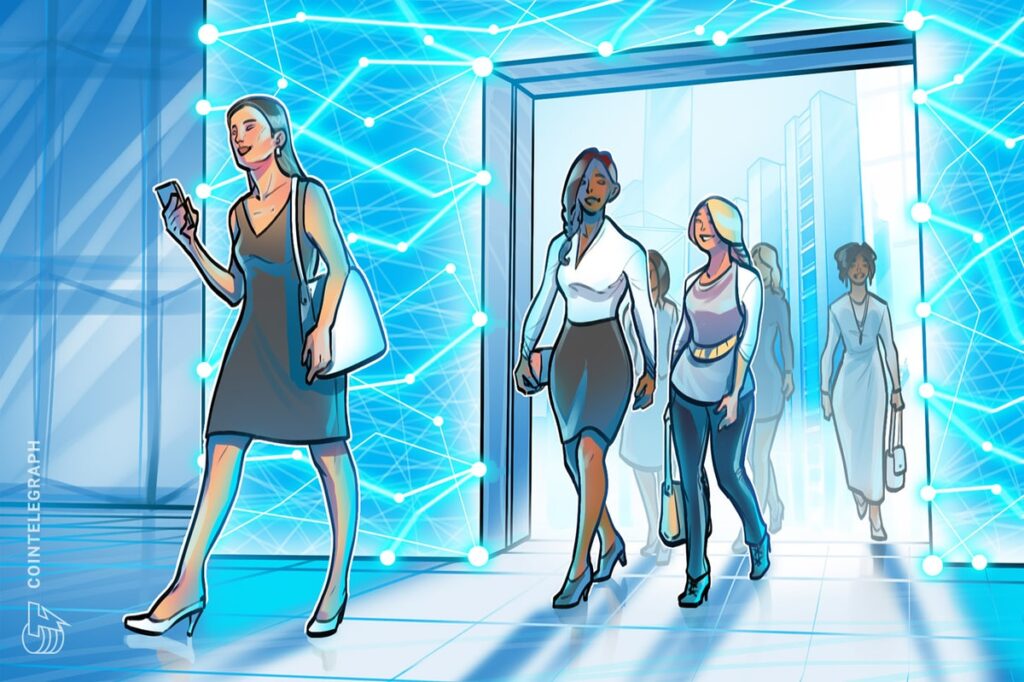Barriers remain for women in Web3.

The fledgling crypto industry combines technology and finance – two fields traditionally dominated by men.
While women's labor force participation increased after World War II, the third and fourth industrial revolutions—both involving technological involvement in industrial and commercial processes—carried a similar glass ceiling for women's advancement.
In the 21st century, there have been efforts to reduce the gender gap in the technology industry and to break the glass ceiling. While more women are entering the tech sector, the gender gap in tech-related careers is still widening and more work is needed.
The blockchain space has expanded exponentially since the launch of Bitcoin (BTC), spawning a new industry. Web3 could represent an opportunity for women to be part of the next revolutionary development in tech and finance.
But, are women being included in this revolution, or is the Web3 industry following the same pattern as the legacy financial and technology sectors?
Why is the participation of women in the web3 industry so low?
Although women have entered the cryptocurrency space and made significant contributions, there is still much work to be done.
Boston Consulting Group's (BCG) 2022 analysis of the industry found that only 7% of Web3 founders are women, and 27% of employees at top crypto startups are women. That gender gap extends to crypto investors as well.

The data clearly shows that the participation of women in the web3 industry is low, but what are the reasons for this?
Cointelegraph asked a number of women from different fields in the Web3 industry for their insights.
Layne Haber, Co-Founder and CEO of The Functionality Protocol, Connect, told Cointelegraph, “One of the biggest roadblocks is the lack of senior mentors and role models.
She added: “Representation at the highest levels is vital as it can shape how young women see their future opportunities.
To Haber's point, a 2022 study by Forex Suggest looked at the disparity in several crypto companies and revealed a lack of female role models, with few companies having more than 20% female representation in senior management or even one woman on the board.
The latest: Diffie's pump and dump programs cost millions and undermine industry integrity.
This lack of women in senior roles creates a negative cycle where women feel underrepresented and are not motivated to enter the field, she said.
Margot Paz, Bitcoin Policy Institute and Bitcoin mining sustainability and environmental advisor, told Cointelegraph that she thinks the main fields that dominate the crypto sector may be the reason for the low participation of women.
“The intersection of technology and finance seems like a perfect storm.”
In finance and technology, the presence of men is much higher than that of women. According to the BCG study, women are more present in Web 3 projects where social skills are more relevant than technical skills.

Cecilia Hsueh, founder and CEO of Layer-2 Blockchain Morph, told Cointelegraph that the Web3 sector, while well-intentioned, can fall into the same trap as other tech sectors.
“While blockchain technology is decentralized and inclusive, differences in leadership roles, funding and women's visibility are still evident.”
Hsueh emphasized that “unequal access to funding for female-led startups” does not help motivate female entrepreneurs to enter the field.
In the year In 2023, the chief operating officer of Vivo Smart Chain, Mariana Krim, wrote that of all the Web3 companies that raised more than $100 million, there were no projects with female founding teams.
Kathy Romero-Finger, co-founder of Web3 marketing agency Babs, told Cointelegraph that women have found it difficult to break into the Web3 space because of its ambiguity.
She said that it is not easy to study Web3 as an intensive profession; It takes a leap of faith, getting his hands dirty and figuring out his path as he goes.
Romero-Finger believes that uncertainty can be “scary for women.” In her opinion, men like to try new things, even if they fail, but women do not. As she said:
“We don't talk about ourselves like men or are willing to take too many risks because we feel easy and maybe we'll be called away if we don't succeed.”
Sandy Carter, chief operating officer of Unstoppable Domains, agrees with this sentiment regarding the fear of failure, telling Cointelegraph that women expect to feel completely confident about entering a new space.
In the year According to an internal Hewlett Packard report published in 2013, women tend to apply for jobs after meeting all the criteria, while men only apply if they meet 60% of the criteria.
Carter believes that women should be bold enough to take more risks to get into the game, even if they are not fully prepared.
Discrimination and “Bro Culture” in the Web3 Industry
All of the women Cointelegraph spoke to were able to immediately present incidents where they felt discriminated against because they were women.
At her first conference, Haber said, no one believed her technical expertise. “People have been asking me about our code redemption and my contribution to it.” Similarly, Hsueh felt she was “challenged to earn money” because she was “not taken seriously in technical discussions.”
Although Romero-Finger is the founder of her own company, she says one client only works with a male executive close to her company. Eventually, she was “forced to take a step back” and let her male team member meet the client.
Paez noted that women receive “more sexism and abuse on social media.”
Carter said she got more attention when she posted tech-related issues on social media under her husband's name.
She also remembers how a bank executive would speak to her male boss even when she came to the meeting professionally. The situation was so confusing that her boss pretended to be sick and suddenly left the meeting, forcing the banker to speak directly to Carter.
The crypto industry has been accused of having a “bro” culture, and events like the 2018 US Bitcoin Conference that ended the event with a reconciliation club didn't help.
As the industry has evolved since then, has the culture changed to become more inclusive?
Romero-Finger believes the industry is still “very focused.” In her experience, she has noticed how a female-led firm can benefit when a man, the third partner in the firm, is called upon.
In Carter's opinion, frat culture is especially hostile to women trying to learn more about the Web3 space, because people aren't open to asking questions. Because of this, she started Unstoppable Women to provide a safe space for women to learn about the Web3 industry.
Solutions for women to enter the Web3 and break the glass ceiling
While there is clearly a glass ceiling, things may be changing.
Web3 is a very young industry that has not yet consolidated. The newness of the industry gives women an opportunity to establish themselves at a higher level.
Latest: Energy-efficient miners in US unlikely to be affected by Bitcoin halving
Haber sees “tremendous potential for women to shape their leadership trajectory.” However, women should not wait too long, otherwise it could be a male-dominated sector with a glass ceiling. Romero-Finger calls to encourage women to enter:
“We're all learning here, so there's no imposter syndrome. It's a great opportunity to dive in, and women should learn to dive in more!”
Some of the most important ways to garner more visibility and support are initiatives like “women-led blockchain education programs, networking events, and targeted scholarships,” Hsu said, adding that he thinks promoting the stories of successful women will encourage others to join and inspire them. Innovation in the Web3 space.













